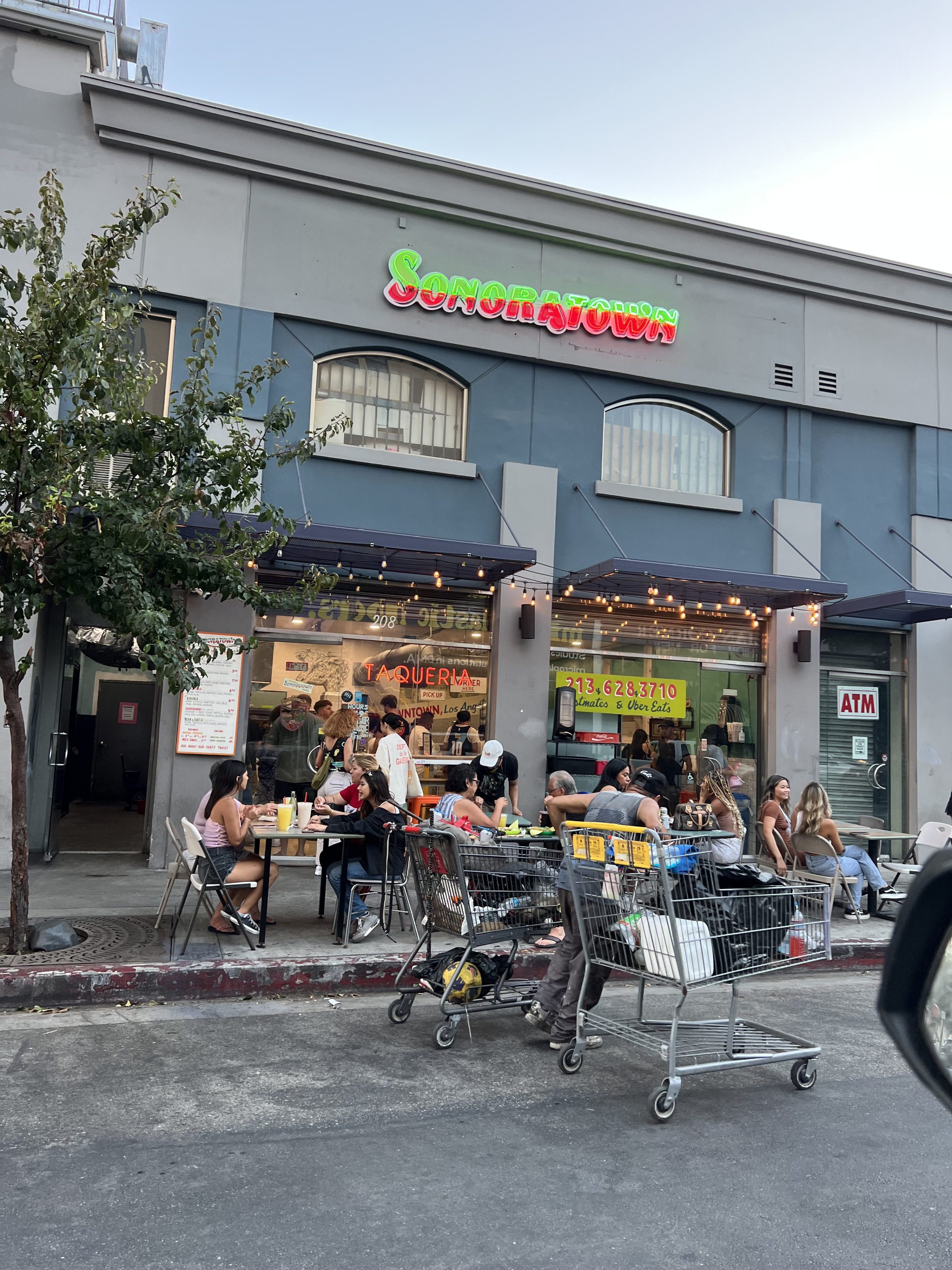Navigating the potentially awkward encounter posed by a person having a mental health episode while you’re eating out in Los Angeles has become as common as eating your favorite tacos in the street.
This reality of doing business in Los Angeles ultimately forced Brittney Valles to close Gogo’s Tacos earlier this month. “I am particularly concerned about the amount of violent and aggressive individuals that regularly hang around the restaurant. We have had guests tell us outright that they do not feel comfortable coming by. We are really hanging on by a thread and are actively looking to move because the neighborhood is just so difficult,” she said in an Eater L.A. article going into detail about the closure.
Her response received pushback from homeless advocates: "The owner of Gogo’s Tacos blamed unhoused people for the closure of her restaurant while failing to mention the impact of its location situated in one of the worst traffic intersections in Los Angeles. The business owner didn’t cite a single incident of concern, and the reporter failed to investigate her vague insinuations about poor people in the neighborhood."
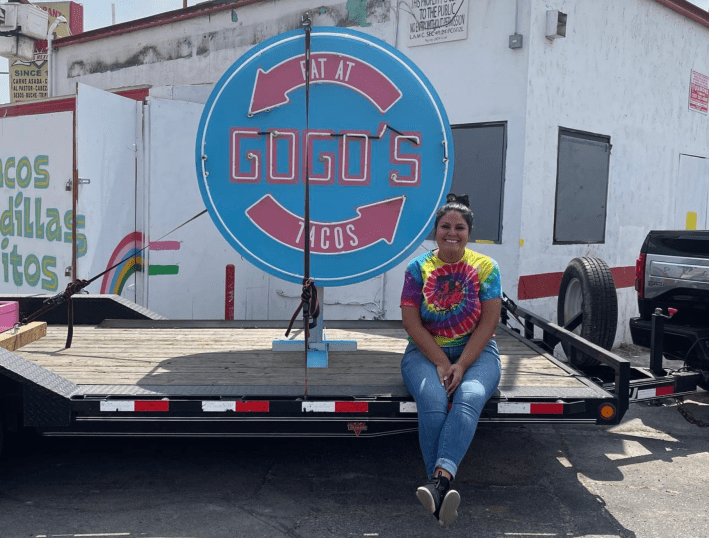
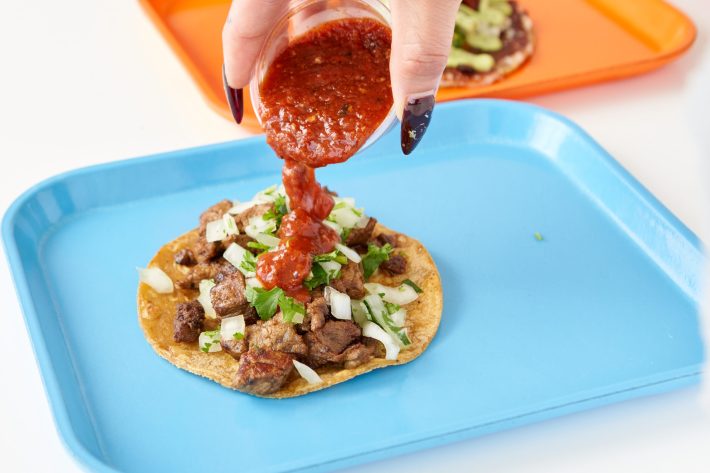
L.A. TACO reached out to Valle for more context and she provided the following response.
Guerrilla Tacos has been open for six years in a very homeless-heavy area. When we first opened, we had a friendly relationship with the unhoused community. We would give food to anybody who came who was hungry and anybody who came looking for work. We give them some money to do around the restaurant tasks. As the years have gone by post-COVID, that relationship has frayed largely because the nature of the unhoused individuals locally has changed. People have become aggressive and more violent than I had ever seen. See the video of my sister getting attacked below.
At Gogo’s, we had many incidents like the ones I told you about, and the frequency just increased. After my sister got attacked, I called our insurance and was informed that if one of our employees gets attacked by an unhoused person and decides to sue us, we are liable. I spoke to my partner, and we felt the risk wasn’t worth it. We were able to profit pretty well from catering, and eliminating a retail business kept our employees safer.
I am very sensitive to the plight of an unhoused person. We went to the local encampment at Gogo’s when we first opened and offered them work. We told them that they didn’t have to adhere to a schedule. They can come when they want and leave and they want and we would pay them cash. Nobody showed.
At Gogo’s, we had our community that would come multiple times a week, and that begged us to stay open. We just couldn’t afford the risk anymore. At one point, our staff was just begging us to close because they felt so unsafe. I am from L.A., and unhoused people do not scare me. Things have just gotten more intense than they ever were.
For taqueros working on the street, such encounters with the public are part of their everyday routine.
This is because taqueros are among the only businesspeople consistently activating every corner of Los Angeles among brick-and-mortar and curbside stands, including marginalized and industrial areas that turn into epicenters for encampments and L.A.’s houseless population.
As a result, many taqueros in the city have grown to be mediators defusing the situations that happen near their places of business. Many of the ways they’ve come to deal with such encounters prove that it is possible to share space.
“When we started, with our truck’s original location in the middle of the train tracks on Slauson, never mind the homeless community, the landlord didn’t even want us there,” Teddy Vasquez, the founder of Teddy’s Red Tacos, tells L.A. TACO. But I earned my place in the train tracks by telling the landlord I could deal with the homeless encampment if he gave me a shot.”
That was in 2017.
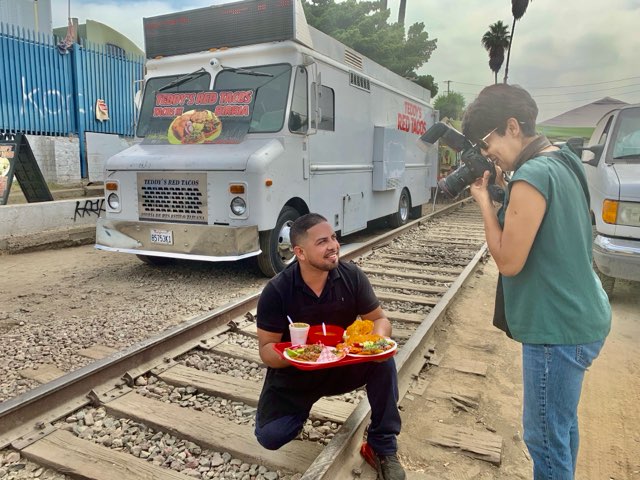
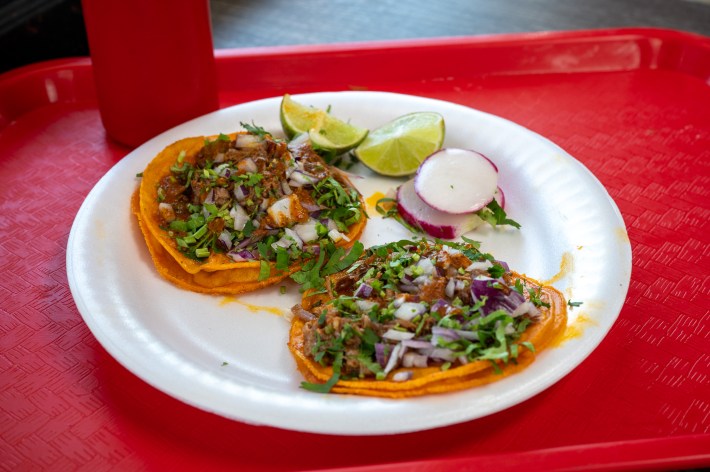
Vasquez is about to celebrate seven years since that location opened on August 1st and is advertising $1 tacos to kick off the anniversary, a notable feat in L.A.’s saturated taco universe. Since then, he has grown the brand to open nine more Teddy’s Red Tacos locations across Southern California.
And how did he first deal with the transient community and neighboring encampment around the train tracks in 2017?
“It was simple to me, really: Instead of treating them like a problem, I treated them like humans,” Vasquez says in a matter-of-fact tone. “I made friends with them. I always invited them over for a free consomé, a free taco, or a free drink. I won them over with love and respect, not violence.”
They have nothing to lose, and as business owners, we have everything to lose. It’s simple to get mad, but it takes more effort to be compassionate.
Teddy Vasquez, founder of Teddy's Red Tacos
“I knew them by name, and once they saw that I treated them with respect, I also asked them if they could respect our customers, who often were children,” Vasquez explains. “In my experience, caring about others will open many more doors for you than not caring for them.” Vasquez’s humble origin story, spanning his days as an L.A. native and his roots in Puebla, Mexico, to pioneering L.A.’s Tijuana birria craze—and arguably the rest of the country’s—is no secret. It’s been the subject of a Super Bowl commercial and countless interviews where the taquero opens up about his own mental health struggles.
“We don’t need to be experts on the homeless,” he says. “No one gave me classes on this. We just need to have sympathy and put ourselves in their shoes. They have nothing to lose, and as business owners, we have everything to lose. It’s simple to get mad, but it takes more effort to be compassionate. Just do the right thing; most of the time, doing the right thing involves treating others like humans.”
Not Just Streetside Taquerías
Having a presence in Downtown’s Fashion District, their own neighborhood, was a significant deciding factor for Jennifer Feltham and Teodoro Diaz when they opened their groundbreaking taquería, Sonoratown, in 2016. It specializes in San Luis Rio Colorado-style asada and was just a five-minute walk from their apartment.
“Business was in the middle of an upswing when we were looking for a space in 2015,” Feltham tells L.A. TACO. “Many of our neighbors owned small businesses, and it felt like there was a lot of optimism about the community. When we found our first spot, the price was higher than we had hoped.”
Nonetheless, Feltham and Diaz negotiated a bit and signed the lease. At the time, they never saw having a location in the heart of Skid Row as a concern for their ambitious taquería because their own apartment was there, too, on Winston and San Pedro Streets.
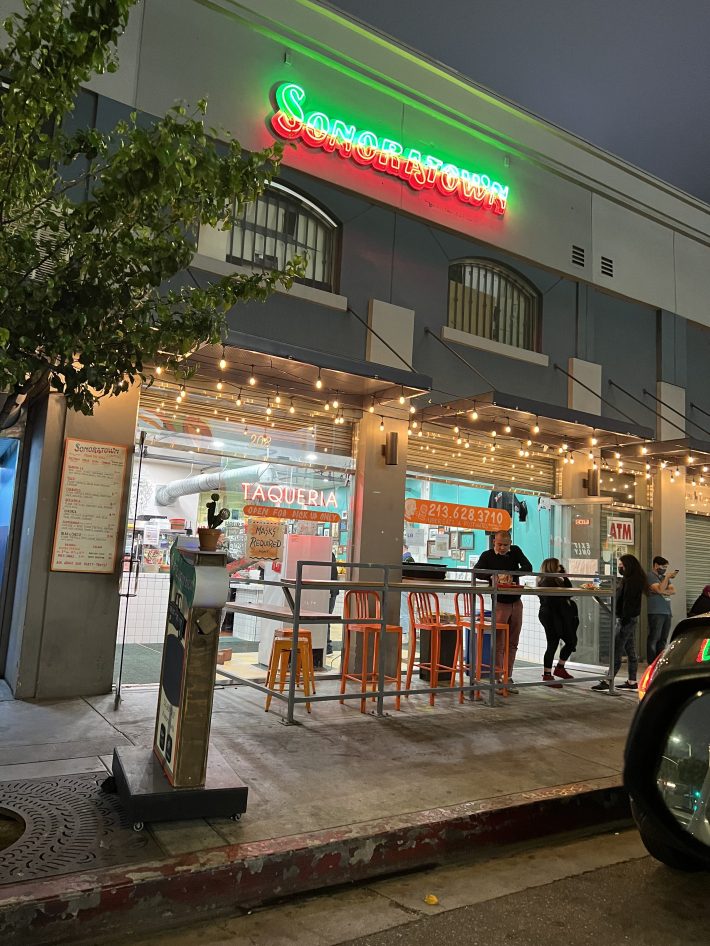
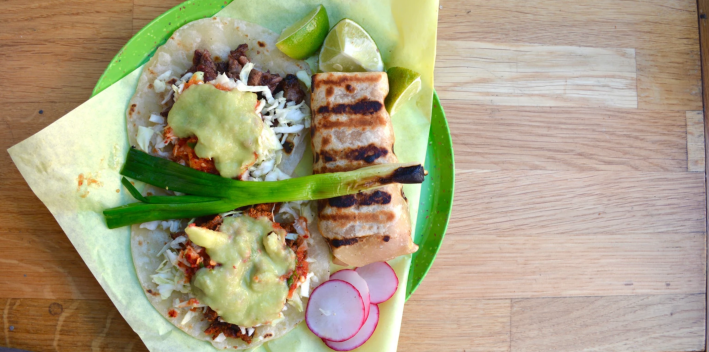
“Some blocks of downtown are problematic, even in the more heavily trafficked areas,” Feltham says. “You have to be aware of your surroundings. I just see Skid Row as part of downtown.”
Before opening Sonoratown, Feltham and Diaz worked at Bar Amá a few blocks away. Feltham was raised in Harbor City, and Diaz is from San Luis Rio Colorado, Sonora.
“The denizens of Skid Row are pretty mobile during the day, and then they return to Skid Row to sleep,” she says. “I don’t think Skid Row is especially dangerous except for walking in the streets when the sidewalks are blocked. And there are some streets to favor and others to avoid. Some of the more highly trafficked parts of the historic core are more dangerous, in my opinion.”
Her approach to dealing with unsavory interactions between Sonoratown’s customers and the occasional houseless person undergoing a mental health episode was guided by living downtown for years.
“We lead interactions with customers, neighbors, vendors—everyone really—with empathy and kindness,” she says. “It's all part of the umbrella of giving good service, which is so important to me.”
“It’s a balance,” she continues. “You must also have boundaries, as with any relationship in life. You must be firm when asking people to respect your boundaries. It’s a lesson to keep top of mind in any interaction with any fellow human being.”
However, when asked if she thinks their proximity to Skid Row has made business worse, she doesn’t hold back, especially since many of her daily customers eat on the sidewalk in front of the now-expanded restaurant. “Absolutely there are people who won’t come to visit us because of where we are located in the city,” she says. “Or also, people who come to visit us that have ugly things to say about homelessness.”
Fortunately, that’s a small percentage of their customer base.
On a warm summer night, a little after the dinner rush, the sun is going down, but Sonoratown is still packed. Most of their alfresco tables are filled with customers of all ages and backgrounds taking bites of their braised cabeza tacos and chiltepin-sauced chimichangas covered in criss-crossed grill marks.
In eight years of running Sonoratown, she’s never had to call the cops on any situation.
Jennifer Feltham, co-owner of Sonoratown
“Honestly, I’m proud to say we broadly attract positive and kind people as customers,” Feltham notes. “If you can’t acknowledge the humanity of someone without a home, you also might be the kind of person who is cruel to service industry employees. That’s not our clientele.”
In eight years of running Sonoratown, she’s never had to call the cops on any situation. She credits her local BID (Business Improvement District) for handling most provocations since they are responsive and trained in de-escalation tactics, even some “shocking” ones involving homelessness.
“After having a business in DTLA and living in DTLA, I have so many stories,” Feltham says. “Some are sweet and shocking, but they all make me sad. I hope our elected officials can do a better job of solving this crisis. I think organizations like the BID and their clean team are great resources. I wish every neighborhood of LA could have a BID.”
Feltham’s support for BIDs goes against the counternarrative that these self-policing entities have been found to also be “anti-homeless,” according to a study in 2018 from UC Berkeley Public Law. In 2020, the Los Angeles County Superior Court issued a bench warrant for the head of Chinatown’s Business Improvement District for failing to produce documents two city watchdogs claim could prove he and other business owners were trying to stop the formation of a neighborhood council in Skid Row.
“The [BID] knows our names and neighbors' names, too, whether housed or unhoused,” Feltham says. “That means a lot to me.”
Good Tacos Sell
The general question of dealing with homelessness in California is seemingly eternal. Still, it is timely again as all Californian cities scramble to interpret Governor Gavin Newsom’s recent executive order that mandates all municipalities to independently address encampments in their communities “with urgency and dignity.”
Los Angeles has pushed back on this order.
On the eastern border of Skid Row, at Central Avenue and 6th Street, Yxta Cocina Mexicana closed its doors after 15 years open in a strip mall next to Metro’s bus yard. In the restaurant’s post about the shutdown, owner Jesse Gomez didn’t attribute the closure to their proximity to the country’s capital of homelessness. Their lease was up, and it didn’t make sense for Gomez to renew it with the landlord’s new market rate.
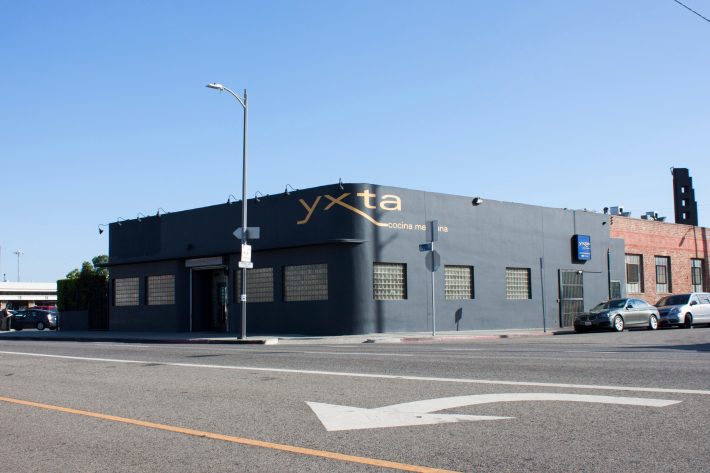
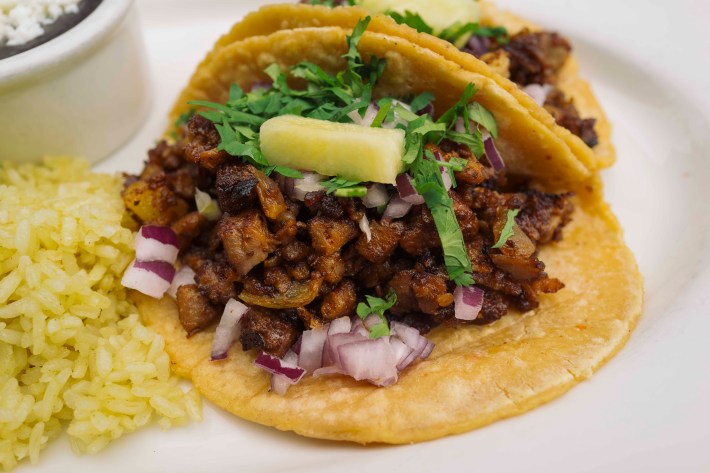
“We dealt with homelessness because it was a part of our landscape,” Gomez tells L.A. TACO. “We never tried to be too aggressive with them, and only a handful of times did we have to call law enforcement because someone got unruly. Luckily, many city officials frequented Yxta,” he says. “So getting their help when needed was not an issue.”
Like Feltham, Gomez also credits his BID with helping the staff gracefully remove anyone loitering or sleeping around the restaurant. However, he acknowledges that Skid Row’s houseless population swelled up after COVID.
When asked if he thought his houseless neighbors deterred his customers from returning to the restaurant. Gomez harkens the conversation to the golden rule of opening any restaurant: “Good food sells, bro. That’s the bottom line.”
